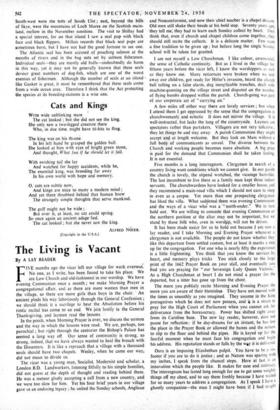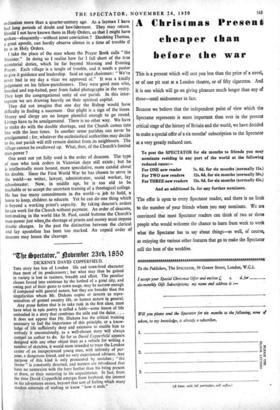The Living is Vacant
By A LAY READER
F1VE months ago the vicar left our village for work overseas': No one, as I write, has been found to take his place. We are Low Church and old-fashioned in our worship. We have evening Communion once a month ; we make Morning Prayer a congregational affair, and as there are more women than men in the village, so there are more girls than boys in the choir. ' An ancient plods his way laboriously through the General Confession ; we should think it a sacrilege to hear the Absolution before his rustic recital has come to an end. We join lustily in the General Thanksgiving, and laymen read the lessons. .
In the porch, when Morning Prayer is over, we discuss the sermon and the way in•which the lessons were read. We are, perhaps, too. parochial ; but right through the centuries the Bishop's Palace has seemed a long way off. Our sense of community is strong, so strong, indeed, that we have always wanted to heal the breach with the Dissenters. It is like a reproach that a village with a thousand souls should have two chapels. Wesley, when he came our way,
did not mean to divide us. .
The vicar was a young man, Socialist, Modernist and scholar, a London B.D. Landworkers, listening fitfully to his simple homilies, did not guess at the depth of thought and reading behind them. He was a meteor gladly accepting a call from a new country, and we were too slow for him. Yet his four brief years in our village gave us an enduring legacy ; he united the Sunday schools, Anglican and Nonconformist, and now their chief teacher is a chapel deacon. Old men still shake their heads at his bold step. Seventy years ago, they tell me; they had to learn each Sunday collect by heart. They think that, even if church and chapel children come together, they should still recite the collects. It is a delicate matter. Few want a fine tradition to be given up ; but before long the single Sunday school will be taken for granted.
I am not myself a Low Churchman. I like colour, ceremonial, the sense of Catholic continuity. But as I lived in the village for
fifteen years before the vicar left, I know the worshippers as well as they know me. Many reticences were broken when we sent away our children, got ready for Hitler's invasion, heard the church bell tolling on a false alarm, dug inexrlicable trenches, dealt with machine-gunning on the village street and disputed on the number of flying bombs dropped within the parish. Church-going was part of our corporate act of "carrying on."
A few miles off either way there are lovely services ; but when I attend them I get oppressed by the sense that the congregation is churchwomanly and eclectic It does not mirror the village. It is well-instructed, but lacks the tang of the countryside. Laymen are spectators rather than partakers. Villagers are not Very talkative; they let things be and stay away. A parish Communion they might accept and at length welcoine. But they look on Mass without a full body of communicants as unreal. The divorce between the Church and working people becomes more absolute. A big price is paid for the demand that Communion shall be taken fasting. It is not essential.
Five months is a long interregnum. Clergymen in search of a country living want conditions which we cannot give. In our parish
the church is lovely, the stipend wretched, the vicarage barn-like. The last incumbent to live there as a family man kept three indoor servants. The churchwardens have looked for a smaller house, and they recommend a main-road villa which I should not care to sleep in even as a corpse. Yet more than one prospecting clergyman has liked the villa. What saddened them was evening Communion and the ways of a vicar who was a "north-ender.". We in turn hold out. We are willing to concede that evening Communion or the northern position at the altar. may not be important, but we stand by those folk who, even in worship, will not be driven.
It has been made easier for us to hold out because I am now a lay reader, and I take Morning and Evening Prayer whenever a clergyman is not available. 'The people do not know whether they like this departure from settled custom, but at least it marks a step up for the congregation. For one who is nearly fifty, the experience
is a little frightening. You think that you know the services by
heart, and memory plays tricks You stick closely to the large print of the 1662 Prayer Book on your sfall, and eventually you
find you are praying for "our Sovereign Lady Queen Victoria." As a High Churchman at heart I do not mind a prayer for the departed, but a titter has gone up from the choir.
The more you publicly recite Morning and Evening Prayer the more you are aware of their blemishes. They have not moved with the times as smoothly as you imagined. They assume in the King
prerogatives which he does not now possess, and it is a strain to pray for the High Court of Parliament when you cannot ask for
deliverance from the bureaucracy. Power has shifted right away from its Caroline base. The new lay reader, however, dare not pause for reflection: if he day-dreams for an instant, he has lost
the place in the Prayer Book pr allowed the banns and the notices to slip to the floor and behind the pipes. He is, keyed up for the fearful moment when he must face his congregation and begin his address. His reputation stands or falls by the way it is delivered.
Ours is an Imposing Elizabethan pulpit. You have to be a six- footer if you are to do it justice ; and as Nature was sparing with my inches, I speak from the chancel steps. Here at last is an innovation which the people like. It makes for ease and intimacy. The interregnum has lasted long enough for me to get some weightY things off my chest, and to say them freshly because I have waited for so many years to address a congregation. As I speak I have a ghostly companion—the man I might have been if I had sought ordination more than a quarter-century ago. As a layman I have had long periods of doubt and bewilderment. They may return. Should I not have known them in Holy Orders, so that I might have spoken--eloquently—without inner conviction ? Doubting Thomas, a great apostle, can hardly observe silence in a time of trouble if he is in Holy Orders.
I take the place of the man whom the Prayer Book calls "the Minister." In doing so I realise how far I fall short of the true ministerial duties, which lie far beyond Morning and Evening Prayer. Each village is a tangle of trouble, and it needs a pastor to give it guidance and leadership. Said an aged choirman "We've never had in my day a vicar we approved of." It was a kindly judgement on his fellow-parishioners. They were good men who, bearded and top-hatted, peer from faded photographs in the vestry. They kept the congregational unity of our parish. In this inter- regnum we are drawing heavily on their spiritual capital.
They did not imagine that one day the Bishop would have difficulty in finding a successor. Our plight is a sign of the times. Money and clergy are no longer plentiful enough to go round. Livings have to be amalgamated. There is no other way. We have to make do with the double shortage, and the Church comes into line with the lean times. In another sense parishes can never be amalgamated ; for, whatever the ecclesiastical authorities may decide to do, our parish will still remain distinct from its neighbours. The village cannot be swallowed up. What, then, of the Church's limited man-power ?
One asset not yet fully used is the order of deacons. The type of man who took orders in Victorian days still exists ; but he is intellectually more honest, more speculative, more candid about his doubts. Since the First World War he has chosen to serve in the world—as writer, lawyer, administrator, social worker, lay schoolmaster. Now, in middle age, he is too old to be teachable or to accept the uncertain training of a theological college. He has too many commitments in the world—a job to hold, a home to keep, children to educate. Yet he can do one thing which is beyond a working priest's capacity. By taking deacon's orders he can work for the Church without payment. An order of deacons, tent-making in the world like St. Paul, could buttress the Church's man-power just when.the shortage of priests and money must impose drastic changes. In the past the distinction between the clerical and lay apostolate has been too marked. An unpaid order of deacons may lessen the cleavage.















































































 Previous page
Previous page